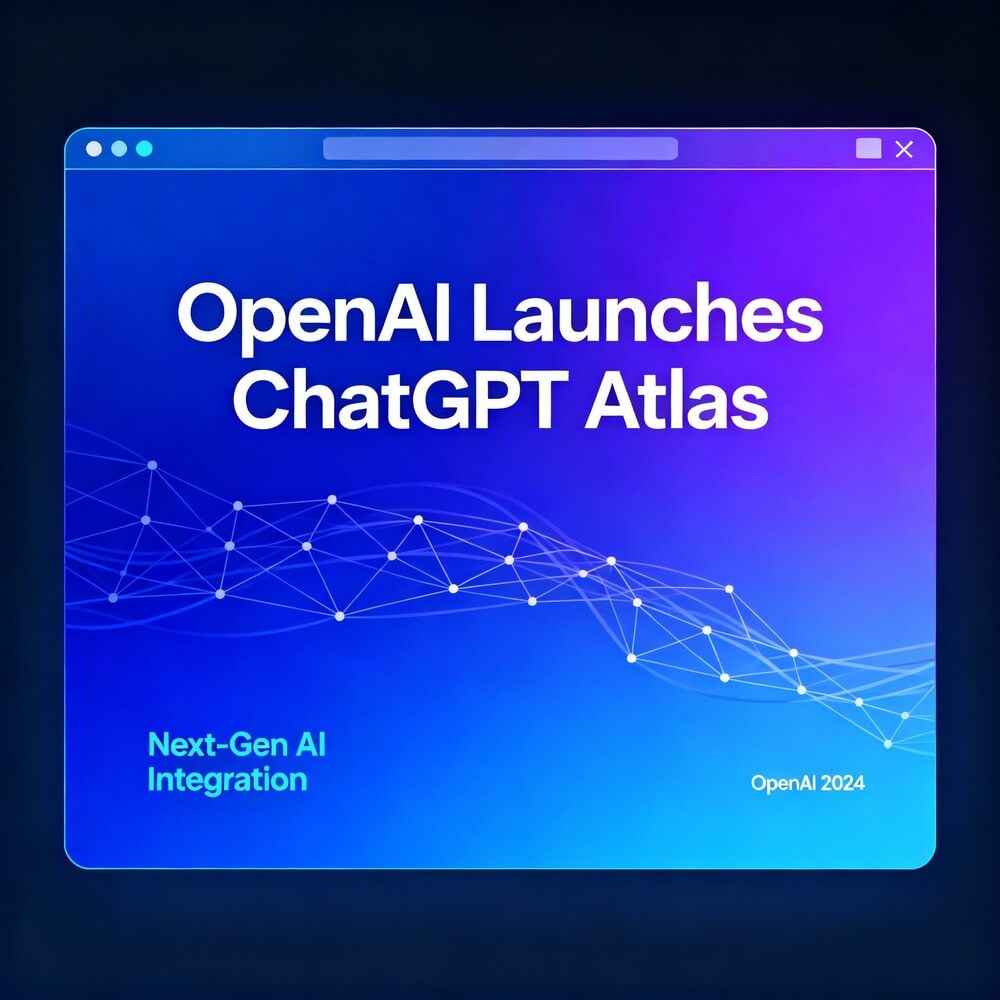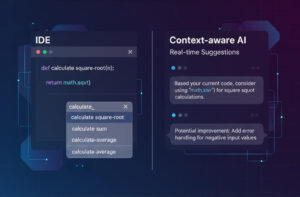OpenAI released ChatGPT Atlas on October 21, 2025—an AI-powered web browser with integrated ChatGPT functionality. Available now for macOS (Windows, iOS, and Android coming soon), Atlas features a ChatGPT sidebar for instant assistance, Agent Mode for automated task completion, and browser memory that personalizes your experience. Built on Chromium, it supports Chrome extensions and aims to challenge Google Chrome’s dominance.

OpenAI has officially entered the browser wars with ChatGPT Atlas, a revolutionary AI-powered web browser that reimagines how we interact with the internet. Announced by CEO Sam Altman on Tuesday, October 21, 2025, Atlas represents OpenAI’s boldest move yet to transform online browsing from a passive experience into an intelligent, conversational partnership. Apple executive shakeup is under way, I want to hear your thoughts on how this will affect the loyal Apple fan base.
Read More: Facebook AI: What Privacy & Security Experts (and Everyday Users) Really Need to Know
Table of Contents
What Makes ChatGPT Atlas Different?
Unlike traditional browsers that simply display web pages, ChatGPT Atlas integrates artificial intelligence directly into every aspect of your browsing experience. The browser replaces the conventional URL search bar with an AI chatbot interface, allowing users to ask questions naturally rather than crafting keyword-based searches.
Key Features of ChatGPT Atlas
-
ChatGPT Sidebar Integration: Access an “Ask ChatGPT” button on every webpage to summarize content, compare products, analyze data, and answer questions without leaving your current page
-
Agent Mode (Preview): Available to ChatGPT Plus, Pro, and Business subscribers, this feature allows ChatGPT to autonomously complete tasks like researching meal plans, booking reservations, shopping online, and compiling documents
-
Browser Memory: ChatGPT remembers your browsing context and past interactions to provide personalized suggestions and recall information from sites you’ve visited
-
Built on Chromium: Atlas runs on the same open-source framework as Google Chrome, meaning it supports Chrome extensions and receives the same security updates
-
Privacy Controls: Users can disable memory, clear browsing history, use incognito mode, and control whether their data is used for model training

Direct Competition with Google Chrome
With over 800 million weekly ChatGPT users, OpenAI is positioning Atlas as a serious challenger to Google Chrome’s decades-long dominance. Sam Altman described this launch as “a rare, once-in-a-decade opportunity to rethink what a browser can be,” emphasizing that AI represents a fundamental shift in how people use the internet.
The timing is strategic. Following a U.S. Department of Justice ruling that labeled Google’s search practices an illegal monopoly, OpenAI sees an opportunity to capture market share while traditional browsers face regulatory pressure.
Read More: The Complete Guide to Smart Refrigerators: How AI is Revolutionizing Your Kitchen in 2025
Availability and Future Updates
ChatGPT Atlas launched globally on October 21, 2025, for macOS users, with Windows, iOS, and Android versions promised soon. The browser is free to use, though Agent Mode functionality requires a paid ChatGPT Plus or Pro subscription.
If ChatGPT Atlas and other AI tools are making your Windows machine feel heavy, this Windows 11 AI performance guide for gaming and productivity PCs shows how to reclaim CPU and RAM without giving up AI features.
OpenAI has already announced upcoming improvements including user profiles, tab grouping, an optional ad blocker, enhanced agent response times, and better compatibility with cloud services like Google Drive and Excel.
Privacy and Security Considerations
While Atlas offers powerful capabilities, cybersecurity experts have raised concerns about privacy risks. The combination of browser-level access with AI memory creates new vulnerabilities, including susceptibility to “indirect prompt injection” attacks. OpenAI has implemented safeguards preventing the agent from accessing passwords, running code, or downloading files without permission.
The Bottom Line: ChatGPT Atlas represents a significant evolution in web browsing technology. Whether it can truly dethrone Chrome remains to be seen, but OpenAI’s massive user base and innovative AI-first approach make Atlas a serious contender in the browser market.
ChatGPT Atlas: Pros and Cons
| Pros | Cons |
|---|---|
| Native AI Integration– ChatGPT built directly into the browser for instant assistance on any webpage | Limited Platform Support– Currently only available for macOS; Windows, iOS, and Android versions still pending |
| Agent Mode– Automates complex tasks like research, shopping, and booking reservations without manual clicking | Security Vulnerabilities– Susceptible to indirect prompt injection attacks and potential data leaks |
| Browser Memory– Remembers context and preferences for personalized browsing experiences | Agent Mode Requires Subscription– Advanced automation features only available to ChatGPT Plus/Pro users |
| Chrome Extension Support– Built on Chromium, so works with existing Chrome Web Store extensions | Privacy Concerns– AI has access to browsing data, raising questions about data collection and usage |
| Free to Use– Core browser functionality available at no cost to all users | Early Stage Issues– New browser experiencing bugs, slower performance, and limited features compared to mature browsers |
| Conversational Search– Natural language queries replace traditional keyword-based searches | Google Services Integration– Limited compatibility with Google Drive, Docs, and other cloud services (improvements planned) |
| Sidebar Functionality– Quick access to ChatGPT without disrupting current browsing | Unproven Long-term Reliability– Lack of track record for stability, updates, and enterprise support |
| Memory Controls– Users can disable memory, clear history, and use incognito mode | Potential Bias– AI responses may reflect training data biases or prioritize certain sources |
Read More: The Future of Human-AI Collaboration in Creative Industries
Frequently Asked Questions (FAQ)
Q: What is ChatGPT Atlas?
A: ChatGPT Atlas is OpenAI’s AI-powered web browser that integrates ChatGPT directly into the browsing experience, allowing users to chat with web pages, automate tasks, and receive personalized assistance.
Q: Is ChatGPT Atlas free to use?
A: Yes, ChatGPT Atlas is free for all users. However, advanced features like Agent Mode are exclusive to ChatGPT Plus, Pro, and Business subscribers.
Q: What platforms support ChatGPT Atlas?
A: Atlas is currently available for macOS. OpenAI has announced that Windows, iOS, and Android versions are coming soon.
Q: Can I use Chrome extensions with Atlas?
A: Yes! Because Atlas is built on Chromium (the same framework as Chrome), it supports all Chrome Web Store extensions.
Q: What is Agent Mode in Atlas?
A: Agent Mode is a preview feature that allows ChatGPT to complete tasks autonomously by opening tabs, clicking buttons, filling forms, and navigating websites on your behalf—like booking reservations or shopping online.
Q: Is my browsing data private in Atlas?
A: OpenAI states that browsing content is not used to train AI models by default, and users have full control over memory settings, history deletion, and incognito browsing. However, security experts recommend caution when using Agent Mode with sensitive information.
Q: How does Atlas compare to Google Chrome?
A: Atlas offers native AI integration, conversational search, and automated task completion, while Chrome provides a mature ecosystem, broader platform support, and extensive third-party extensions. Atlas is AI-first; Chrome is search-first.
Q: What are the security risks of using Atlas?
A: Cybersecurity experts warn that AI browsers like Atlas are vulnerable to “indirect prompt injection” attacks, where malicious code embedded in web pages can manipulate the AI agent. OpenAI has implemented safeguards, but users should remain cautious.
Conclusion
ChatGPT Atlas marks a pivotal moment in the evolution of web browsing. By seamlessly integrating AI assistance into every aspect of the browsing experience, OpenAI has created more than just another Chrome alternative—they’ve reimagined what browsers can accomplish.
While the platform is still in its early stages and faces legitimate privacy and security concerns, the innovative features like Agent Mode and contextual memory offer a glimpse into the future of intelligent web navigation. For users seeking a more conversational, automated browsing experience, Atlas presents a compelling reason to reconsider their default browser choice. As OpenAI continues to refine the platform and expand its capabilities, ChatGPT Atlas could very well become the catalyst that transforms how billions of people interact with the internet.
Resources: Tech Crunch, OpenAI, PCMag







